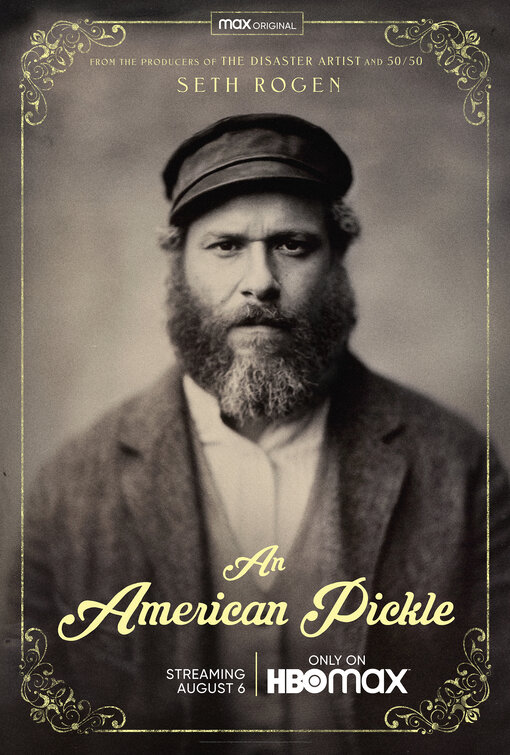Herschel Greenbaum (Seth Rogen) has always clung to hopes
for a better life. After the village that he and his wife, Sarah (Sarah Snook), call
home was destroyed, Herschel’s ambitions carry them both to America. Here, in
the year 1919, Herschel is sure he can start a family that will soon exceed
their humble origins. However, his plans hit a snag when Hershel, while working
at a pickle factory, falls into a vat of pickles. The vat is sealed up as the
factory is shut down, leaving Hershel to be brined for 100 years.
He’s eventually reawakened in the modern era not
having aged a day. However, the world around him has transformed drastically. Luckily,
Herschel has somebody to help him navigate this strange land through his only
living relative, great-grandson Ben Greenbaum (also Seth Rogen). Initially, An
American Pickle wrings amusing gags out its high-concept starting premise. A
joke about a scientist offering a “satisfying explanation” for how on Earth
Herschel survived a century in brine that gets drowned out by Herschel’s
voice-over is clever. A subsequent joke that see’s Herschel’s life-long desire
for seltzer water being quickly satisfied by a gizmo in his great-grandson’s
kitchen is equal parts amusing and endearing.
Eventually, though, Simon Rich’s screenplay struggles
to stretch this premise into a feature-length movie. In attempting to
accomplish this goal, An American Pickle becomes a Spy vs. Spy scenario
about Herschel and Ben trying to one-up each other with their respective
independent businesses. The gags in these situations just aren’t particularly humorous
and too often it feels like An American Pickle lost the whole concept of
a man being displaced 100 years out of time. Maybe these scenes would have
worked better if the two lead characters had been better developed prior to
them being at each other's throats.
Ben, especially, lacks much of a discernible
personality before he strikes up a fierce rivalry with his great-grandfather.
That makes it hard to get invested in the series of misadventures that make up
the second act as well as the moments where An American Pickle wants to
tug at your heartstrings. Proving more effective in terms of poignancy are any
scenes related to how Judaism impacts the lives of the two lead characters. A
climactic scene of Ben entering a synagogue for the first time in years and
finding solace is an especially well-realized sequence from how it's shot to Rogen’s performance as Ben. This
scene and any other moments reference the Ben and Herschel’s Jewish heritage
have a sense of specific detail to them that the weaker sections of An
American Pickle lack.
Also proving commendable is the lead performances from
Seth Rogen. Even if the script doesn’t give him a lot to work with in the part
of Ben, Rogen still does good work conveying Harold and Ben as two distinctly
different people. His organic chemistry with, well, himself, is also emblematic
of how An American Pickle does such good work in making you buy that we’re
watching two distinct human beings on-screen. Sometimes, comedies like Austin
Power wring big laughs out of drawing attention to filmmaking techniques used
to cover up that an actor is playing multiple roles. That wouldn’t work for the
more dramatic An American Pickle and the film clearly recognizes this.
The camerawork and editing choices in An American Pickle rarely reminds one that director Brandon Trost is working around logistic hurdles related to Rogen’s dual performances. It’s the same kind of camerawork and editing choices you’d see if the movie starred two different people. Meanwhile, scenes featuring both Ben and Herschel together lack any distracting reminders that we’re watching two performances fused together through digital trickery. The visual effects work used to bring two Seth Rogen's to the silver screen, er, your HBO MAX account reflects the solid visual scheme of An American Pickle, which includes cinematography by John Guleserian. A pity that two strong Seth Rogen performances and commendable visual flair are weighed down by An American Pickle’s more underwhelming script.

No comments:
Post a Comment